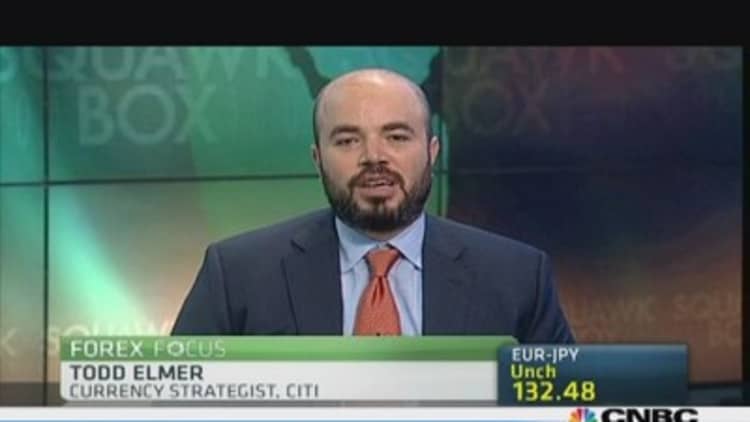A lack of detail from Japan's Prime Minister Shinzo Abe about how the government will buffer the economy from a controversial rise in the sales tax adds pressure on the Bank of Japan to step up its monetary stimulus in the months ahead, analysts say.
Abe, who implemented radical economic policies – dubbed Abenomics – to revive the world's third-biggest economy, said on Tuesday the country's sales tax would rise to 8 percent from 5 next year as planned. The hike is seen as necessary to help ease Japan's heavy debt load.
(Read more: Japan's Abe calls for cut in corporate tax rate)
But an announcement on a stimulus package to offset the impact of the tax hike fell short of expectations. Instead of unveiling a cut in corporate tax, as anticipated by analysts, Abe said he had asked ruling parties to start a debate on corporate tax cuts and that a 5 trillion yen ($51 billion) stimulus package would be compiled in December.
"The stimulus announcement probably erred to the downside of what the market was looking for and there was some disappointment with substantial progress towards structural reform. We didn't get an immediate announcement on corporate tax reform and that also disappointed some investors," Citi Currency Strategist Todd Elmer told CNBC Asia's "Squawk Box."
"Ultimately, what this does is put a bigger burden on the Bank of Japan (BOJ) to offset the impact of the sales tax hike and I think that means the yen will weaken," he added, referring to a move in the currency in the months ahead.

Disappointment with Abe's announcement helped push Japanese stocks to a three-week low on Wednesday.
There had been some talk in recent weeks that the BOJ could ramp up its asset purchase program to support the economy if Abe raised the sales tax. The last time Japan lifted the tax, to 5 percent from 3 percent, was in 1997 and that move is partly blamed for tipping the economy into recession.
(Read more: Here's what may trigger BOJ stimulus)
"I'm concerned that Abe has bitten off more than he can chew," said Keith Fitz-Gerald, chief investment strategist at Money Map Press which publishes a monthly investment newsletter. "He has taken a calculated gamble to raise taxes when Japanese families are already struggling with a rising cost of living and falling wages."
Japan's sales tax is scheduled to rise next April and then in 2015 to 10 percent.
The BOJ will hold a regular policy meeting on Thursday and Friday; any comments on the sales-tax hike are likely to be watched closely. BOJ chief Haruhiko Kuroda has said previously that he supports a rise in the tax as a step to get Japan's finances in shape. The country has the highest debt load in the developed world.
Economists say that while they do not expect any near-term reaction from the BOJ, the central bank could ease monetary policy next April when the rise in the consumption tax is due to kick in.
"The BOJ would have been looking for a rise in the sale tax as a starting point for more stimulus," said Vishnu Varathan, market economist at Mizuho Corporate Bank.
"Now the question is that since Abe was short on details about economic stimulus, will the BOJ add to its stimulus? My view is that the BOJ is happy with the recovery and the bond market is stable, so a move now is unlikely – doing something next year would make more sense," he added.
(Read more: Feeling good: Japan business sentiment soars)
The BOJ said in April it would pump $70 billion into the economy each month to help push up inflation to 2 percent in two years.
—By CNBC.Com's Dhara Ranasinghe; Follow her on Twitter @DharaCNBC


